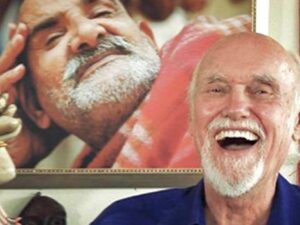Ram Dass’ experience with his guru was of unconditional love – and acceptance – Maharaj-ji broadcast love. Another person who followed his teachings said: ‘It’s appropriate he loves everyone – he’s a saint. The real miracle is that I love everyone when I am around him.”. Ram Dass said that the realization that he was loved unconditionally with all his imperfections changed him.
‘I actually began to love myself too. Not in the self-aggrandizing ego-inflating way, but by seeing myself as a loving being, as a soul. Once I could forgive my imperfections, the same guilt and shame for which he had forgiven me, I could begin to love and forgive others as well.’
In the last decades of his life Ram Dass was living with the after effects of a serious stroke which led to much struggle, suffering and increasing disability. It was also a time of slowing down and deep reflection. Writing about karma, Ram Dass says:
‘We think of karma as a kind of action and reaction, cause and effect, but karma is organic and very subtle. I don’t know how well we can understand it from within our incarnation. Even the view that everything happens for a reason treads the slippery slope of fate or predestination versus free will. Both are true!
As I turn toward Maharaj-ji within, my understanding of family changes. I see the work each soul has to do when it takes birth. When I think of my years as a therapist, I would work very differently now. From Maharaj-ji’s long view, a person is not just a bundle of adult needs and childhood traumas, the building block of personality. It is a much subtler picture of karma working out across incarnations.
We may have regrets about our family, or, as I did for many years avoid or resent them. But the soul demands that every moment-to-moment experience of living be meaningful, fulfilling and real. The soul’s game is not about reorganizing external life. It’s not about getting a new job, friends, lifestyle, making more money or getting a new car, finding a new partner or a new therapist – or ignoring the family history.
It’s about inner reorganization, reorienting toward your soul. The battle of the Bhagavad Gita is not about dropping out or leaving the family. Where can you drop out to that your soul is not present? No, this life is about finding a way to be in the world that connects you to your soul.’
